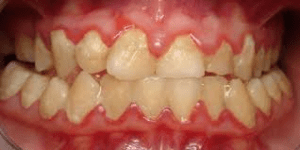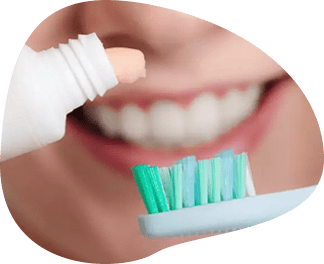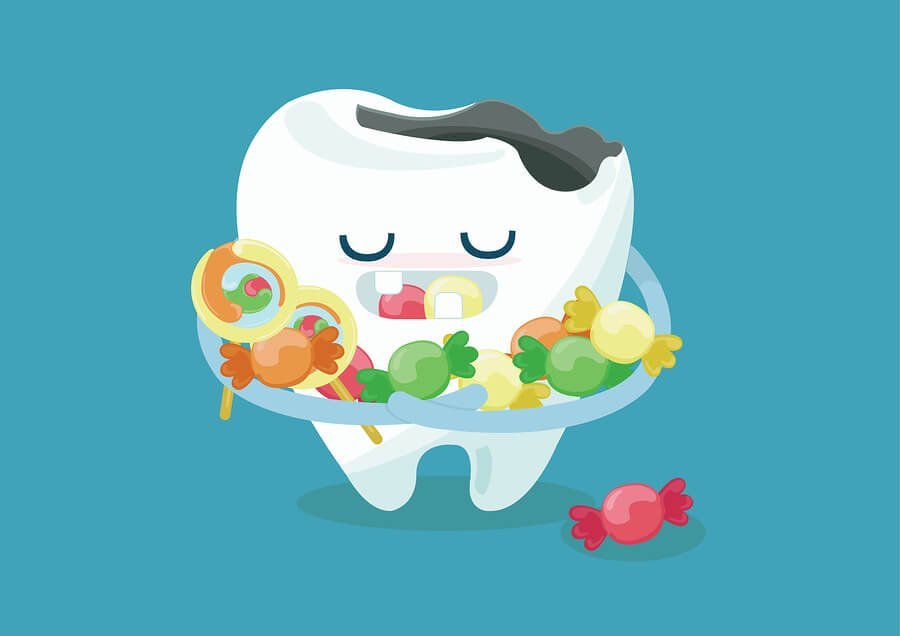What is Gum Disease?
Patients often don’t spot gum disease until it’s too late. Gum disease in the early stages is reversible with regular check-ups and professional cleaning appointments. If gum disease is left untreated, it can lead to periodontitis which destroys the bone around your tooth that holds the tooth in place and, in some cases, loose teeth leading to tooth loss.
Gum Disease Risk Factors & Causes of Gum Disease
Poor Oral Hygiene
Gum disease can be caused by many factors, but poor oral hygiene is the most common cause. Our mouths are full of bacteria, when you consume sugary food and drinks they combine with the bacteria in your mouth to form a sticky surface on your teeth called dental plaque. It is important to be conscious of what causes plaque to develop so that you can reduce this. If teeth aren’t brushed adequately this plaque remains on your teeth and gums and hardens. Plaque build-up under the gums causes gum disease as it irritates your gums leading to them becoming tender, sore and red.

Smoking
Tobacco use as we all know is directly related to a number of health problems, some of which include cancer and heart disease. Furthermore, smoking even 1-4 cigarettes a day increases your risk of developing gum disease by 50%. This is because smokers are more likely to produce dental plaque; this plaque leads to a gum infection. As smoking weakens your immune system, it is harder to fight the gum infection resulting in the gums taking longer to heal. If the gums disease is not treated often this leads to permanent damage. Stats show smokers are twice as likely to lose their teeth long- term to non-smokers.
Cigarettes are carcinogenic; this means they contain substances that can damage the cells in your body, leading to cancer. Not only can cigarettes cause lung and throat cancer, but they’re also very prevalent in causing mouth cancer. Cancer Research UK state that around 25 out of 100 of mouth and oropharyngeal cancers in the UK (around 25%) are caused by smoking.
If you would like to stop smoking you can find support here.
You can view more information about mouth cancer here, such as identifying symptoms.
Health Factors
Systemic Disease – Diabetes
Systemic diseases interfere with your body’s inflammatory response causing gum disease. Poorly controlled diabetes is one of the most common diseases in increasing your risk of developing gum disease. Patients with type 2 diabetes are at a higher risk than patients with type 1 diabetes however it is important both types are controlled.
Having high blood sugar levels for a long period of time can lead to more sugar in your saliva, increasing the acid-producing bacteria in your mouth. This bacteria attacks and damages the blood vessels in your gums and this makes them more likely to get infected.
In turn it can affect you the other way around too. If you have gum disease, the infection can increase your blood sugar levels, which can lead to other complications such as heart disease.
Medication
Certain medications are known to increase the risk of you getting gum disease. Some of which include antidepressants, oral contraceptives and certain heart medicines. It is important to inform your dentist of any changes to or new medication you may be taking. The dentist will be able to advise you on the best way to prevent gum disease or treat it accordingly.
Other Factors in Gum Disease
Genetics
Research has indicated that some people may be genetically susceptible to gum disease. Despite aggressive oral hygiene habits, these people may be more likely to develop periodontal disease. Let your dentist know if you have a family history of gum disease. Regular check-ups are advised as your dentist can look for signs of gingivitis as well as more advanced periodontitis.
Stress
Stress is known to affect both your general and oral health. Research has demonstrated when you are stressed your immune system is weakened. This makes it more difficult to fight off gum infections. Subsequently, stress and sore gums is a common issue. This is for several reasons, such as affecting your motivation and might lead to less effective daily plaque removal, poor nutrition and increased tobacco use. If you are feeling stressed it is important to let your dentist know who can provide additional supportive care.
Poor Nutrition and Obesity
New evidence suggests a diet low in nutrients can compromise your immune system, making it harder for your mouth to fight off a gum infection. This can contribute to gum disease and potential tooth loss. Proper nutrition means eating a well-balanced diet so that your body can get the nutrients needed for good health and wellbeing. In addition, research has shown that obesity may increase the risk of periodontal disease.
What is the Best Way to Prevent Gum Disease?
- Brush twice a day- brush at night and one other time during the day. It is important to brush all surfaces of your teeth and along your gum line as well as in between your teeth. This process should take you at least two minutes to complete.
- Regular check-ups- see your dentist on a regular basis to ensure you are not at risk of gum disease as often the early signs of gum disease go unnoticed by patients. Also it is always important to notify your dentist of any changes or new medication you may be taking.
- Don’t smoke- researchers found smokers with gum disease who quit smoking experienced a significant improvement in their gum disease within one year of quitting compared to smoker who did not quit. Get help with giving up smoking -NHS Smokefree (www.nhs.uk/smokefree).
- Check your blood sugars- it is important to keep within your target range. People with diabetes are advised to maintain levels of HbA1c of 6.5% (48mmol/ mol) or lower.
- Keep your dentures clean – if you wear them, make sure you clean them regularly as a build-up of bacteria can lead to fungal infections.
- Choose the right food and drink- follow a balanced diet low in sugar. Reduce snacking on junk food throughout the day; instead it is best to have chocolates/sweets during meal time.
How Can I Treat Gum Disease?
As always, ask your dentist for advice. We have two options for patients seeking gum disease treatment
Periodontal Treatment with Dr Stamatios Kioufis our Dentist With a Special Interest in Periodontal Treatment.
Book an appointment with our Dental hygienist.
Frequently Asked Questions
-
What Should Gums Look Like?

Healthy gums generally appear smooth and pointed between teeth. They should not have concentrated areas of redness near the tooth, or be swollen or tender.
They should be firm and not painful to touch. Generally, they should not bleed when brushed or flossed.
-
Can You Get Gum Disease Despite Good Hygiene?
Having a good oral hygiene routine greatly reduces the chances of gum disease, however other factors also contribute such as genetics, hormonal changes or other diseases which impact the immune system.
-
What is the Most Common Cause of Gum Disease?
The most common cause of gum disease is a poor oral hygiene routine. It is recommended to ask your dentist about an effective cleaning routine.


